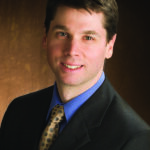Grow Your Practice by Helping People Lose Weight
Michael T. Smith, ND
With almost two-thirds of Americans currently overweight, and the fact that 50% of all deaths are due to preventable causes, including chronic diseases directly related to obesity/overweight (Roberts and Barnard, 2005), we as NDs have the education and tools to shift this trend.
More than 60% of the people who come into our offices need to lose weight. Many of them have, or are trying to do so on their own. Most have likely become frustrated by conflicting information from the media and medical community over which is the right, best or healthiest way to achieve permanent weight loss. There are commercial programs, “quick fix” products and many other pills “guaranteed” to help people lose weight. In addition, television advertisements frequent the airwaves for gastric bypass surgery as the “answer” to weight loss and “cure” for Type II diabetes. In 2007, when one product was introduced as an over-the-counter weight loss pill, it was a huge success, selling more than two million starter kits in the first four months (Saul, 2007). Additionally, some medical weight-loss clinics are using a pharmaceutical approach, often without addressing nutrition, exercise or proper lifestyle issues to ensure long-term success.
Health problems related to overweight/obesity account for $70 billion in health costs annually. Consumers spend an additional $33 billion per year trying to lose weight or prevent weight gain. This equates to more than $100 billion in costs annually (Daynard and Gross, 1997).
A researcher from the University of Florida reported that people who are overweight at age 65 will spend about $16,000 more in healthcare costs than a person of normal weight, while an obese person will spend $26,000 more (Yang and Hall, 2008). There is a clear monetary justification for people to lose weight, in addition to the proven health benefits.
We have an enormous potential as NDs to help those individuals who need to lose weight. With our training, we can see through the hype to offer real solutions to achieve healthy weight loss, and at the same time tap into a profitable market.
Power of the Naturopathic Principles
Many patients come to us out of frustration with the dominant medical system, lack of results and desire for a real solution for weight loss. If we don’t offer a permanent solution to their weight problems, we are doing them a disservice, as their weight may be the cause of most of their health problems. We have various powerful naturopathic tools at our disposal to help alleviate individual health concerns. Many overweight individuals come to us looking for a natural solution for fatigue, hypertension, hyperlipidemia, insomnia, low libido or depression. We can choose to utilize herbs, nutritional supplements, homeopathy, acupuncture; and/or we could treat the probable cause, helping them to lose weight and alleviating their primary concerns as well as preventing future disease. In doing so, we are following our principles of medicine: identifying and treating the cause of their disease, doctor as teacher, prevention and using the healing power of nature.
The challenge that many of us may have is how to develop a permanent weight loss solution or program that follows our principles of medicine. We could invest the time and create our own, but it is valuable to look at weight loss programs that already exist for clinicians.
There are quite a few. A good program should be designed to teach people how to eat real food and utilize portion control, be well structured and easy to follow for the patient as well as easy to implement for the practitioner. It should provide accountability to the patient, as this has been shown to be an important factor in weight loss success (Heshka et al., 2003). For busier practices, parts of a well-structured program could be conducted by a trained nurse or staff member.
Because of the ever-growing weight issues in the U.S., weight loss appeals to the masses. Many of us already are addressing weight loss in our practice, as it is a main cause of many health concerns. There is an opportunity to use the skills and knowledge we have to expand our potential patient base. Leading with weight loss as a marketing message can be powerful in helping to increase a naturopathic practice. With it, you are able to broaden your marketing reach to individuals who never may have considered naturopathic medicine.
Advertising can be costly, and thus needs to be highly targeted so the reader is a likely potential patient. With weight loss, you can broaden your reach to more general publications, increasing the number of referrals. You may find that you do not need to spend much money on marketing to generate new patients for weight loss. Start with your existing patients and their friends and family. Once you help a few patients lose weight, they become an automatic source of referral for your practice.
Creating Walking Referrals
By successfully helping a patient lose a significant amount of fat, other individuals in that patient’s life easily notice, creating a powerful marketing machine. People will congratulate them and ask how they did it. Highlight to your patients all the ways that their weight loss has improved their health. Ask them how it has enhanced their life. Inform them that you would like to help improve other people’s lives in the same way, and ask who else they might know who could benefit from losing extra weight. Further ensure that your successes result in patient referrals by providing current patients with your business cards and invitations to hand out about your weight loss program. Consider offering a referral reward, such as a gift card to a favorite clothing or health food store.
As one example, last year I worked with a patient and helped her lose more than 80 pounds. She gained greater confidence in herself, had more energy, better sleep and an improved sense of well-being. Everyone in her life noticed – her family, people at her work and folks at her church. They all asked how she lost the weight. Out of this, a couple from her church came to my office with a desire to lose weight. I started working with them late last year, and they have lost more than 130 pounds combined. From this couple, my clinic now has an additional 12 people from the same church who have started our weight loss program and are well on their way to their goals. Our weight loss program has become part of the conversation after church.
One patient my clinic worked with last year generated 14 new patients so far, and the numbers continue to grow as more of these referral patients lose weight. Last year we helped more than 60 patients lose weight. This year, weight loss is becoming a significant part of our business. You can see how this can quickly generate new patients for your practice, with very little marketing costs. If these 60 patients each referred only two people to our clinic, that would create 120 new patients. We are expecting greater referrals than this.
Most people who come to us for weight loss have never heard of naturopathic medicine. They seldom ask about our training or education, but they have seen how we helped their friend or family member achieve a healthy weight. They want the same thing, and are ready to start.
Educating on Naturopathic Medicine
The nature of fat loss is that it takes place over time. Patients come to the office each week for a brief check-in so that we can monitor their success and offer support. During these visits we are able to start educating patients on naturopathic medicine and how we work with many people, not only those desiring to lose weight. Almost always they admit that they had no idea about the scope of our training and the conditions we could address. They often can think of someone (if not themselves) who could benefit from our approach. Great, another patient referral!
Our weight loss patients, like most, do not only have weight issues, but also suffer from other health issues that naturopathic medicine can address. One of my recent patients who lost more than 75 pounds had an initial complaint of benign prostatic hypertrophy (BPH) with decreased urination. I recommended a prostate-specific herbal product as well as fish oil. Given this and the weight loss, his urination only slightly improved. I discussed with the patient about how I often address these issues with homeopathy and that we should schedule an appointment to complete a detailed intake. He readily agreed with confidence that I could help, as we had already been successful with his weight loss. After completing a homeopathic intake and prescribing the appropriate remedy, he was amazed at the quick resolution of his urination difficulties. Since that time he has referred two other men with similar issues.
In essence, encouraging weight loss is something you likely are already doing in your practice to help the majority of Americans lead healthier lives. Offering a weight loss program does not have to be difficult or take a lot of time. Explore programs that already exist. The one we use is low-cost, follows naturopathic principles, is easy to follow and implement, and did not require much of our time to learn and conduct.
If you are starting a new practice or looking to grow your current practice, weight loss is an easy way to find new patients who may not have considered coming to see an ND. Once you get them in the door, you can further educate them on the many benefits of a naturopathic approach to health.
 Michael T. Smith, ND is the founder of Carolinas Natural Health Center, a holistic wellness center near Charlotte, NC, where he specializes in classical homeopathy and clinical nutrition. Dr. Smith utilizes the UltraLite program to help patients achieve weight loss for life. He also coaches NDs on starting and building a successful naturopathic practice.
Michael T. Smith, ND is the founder of Carolinas Natural Health Center, a holistic wellness center near Charlotte, NC, where he specializes in classical homeopathy and clinical nutrition. Dr. Smith utilizes the UltraLite program to help patients achieve weight loss for life. He also coaches NDs on starting and building a successful naturopathic practice.
References
Roberts CK and Barnard RJ: Effects of exercise and diet on chronic disease, J Appl Physiol 98: 3-30, 2005.
Saul S: Sales Are Strong for Glaxo’s Weight-Loss Product, New York Times, October 24, 2007.
Daynard M and Gross WC: Federal Trade Commission, Report of the Presiding Panel, Commercial Weight Loss Products and Programs, What Consumers Stand To Gain and Lose, A Public Conference on the Information Consumers Need to Evaluate Weight Loss Products and Programs, October 16-17, 1997.
Yang Z and Hall A: The financial burden of overweight and obesity among elderly Americans: the dynamics of weight, longevity, and health care cost, Health Serv Res, June;43(3),849-868, 2008.
Heshka S et al: Weight loss with self-help compared with a structured commercial program: a randomized trial, JAMA, 289(14):1792-1798, 2003.










